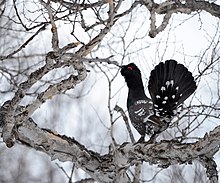Tetrao parvirostris
| Black-billed capercaillie | |
|---|---|
 |
|
| Scientific classification | |
| Kingdom: | Animalia |
| Phylum: | Chordata |
| Class: | Aves |
| Order: | Galliformes |
| Family: | Phasianidae |
| Subfamily: | Tetraoninae |
| Genus: | Tetrao |
| Species: | T. urogalloides |
| Binomial name | |
|
Tetrao urogalloides Middendorff, 1853 |
|
| Synonyms | |
|
Tetrao parvirostris |
|
Tetrao parvirostris
The black-billed capercaillie, or spotted capercaillie, (Tetrao urogalloides) is a large grouse species closely related to the more widespread western capercaillie. It is a sedentary species which breeds in the Larch taiga forests of eastern Russia as well as parts of northern Mongolia and China.
The appearance of the male black-billed capercaillie is the similar to that of its western counterpart, except that it is slightly smaller, has a smaller bill, slightly longer tail, and a shorter beak. The black-billed is also more predominantly black, and there are large white spots at the tips of the uppertail coverts and on wings. The appearance of the female is similar to that of its western counterpart, except that it is greyer with more uniformly scaled underparts, lacks a rusty unmarked breast area, and has more noticeable white spots on wings. Their call is a crackling noise. In the far west of its range the black-billed capercaillie has been known to hybridise with the western capercaillie.
...
Wikipedia

